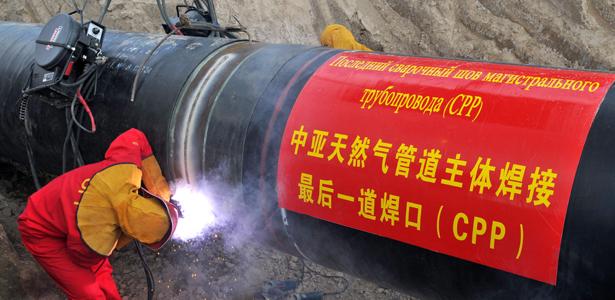
RUSSIA: OIL TO ASIA

As Moscow's relations sour with the West, Russia's energy sector is pivoting to Asia, with oil exports to the region jumping to record highs and analysts predicting a boost for some Asian energy companies.
Russia has sent more than 30% of its oil exports—more than 1.2 million barrels a day, the most ever—to Asia this year, trade and analyst data showed. Around a fifth of Russia's oil exports went to Asia Pacific in 2012, according to the International Energy Agency.
Meanwhile, Russian oil exports to Europe via its largest pipeline network have fallen from a peak of 3.72 million barrels a day in May 2012, to less than 3 million barrels a day in July.
Most of the oil heading to Asia is shipped to China, and comes as Russia seeks to boost ties to the energy-hungry region amid heightened tensions with Europe. While the crude oil is priced at slightly above the Dubai benchmark, it's a plus for Asian buyers as the oil is relatively close and they get to diversify away from the conflict-ridden Middle East.
The impact of sanctions on the gas sector however remains uncertain and energy companies have warned of higher risks. At stake is Russia and China's $400-billion natural gas deal signed in May, which will need a separate network of pipelines and new exploration work to be conducted.
"They are clearly, in the medium term, moving more barrels to Asia," said Johannes Benigni, head of energy consulting firm JBC Energy.
Asia isn't just benefiting from the arrival of more Russian crude oil. Earlier this month sanctions were imposed on the transfer of Western goods and technology to Russia's oil and gas industry, especially for exploration in deep water, the Arctic and shale.
Analysts say chief among the potential Asian benefactors could be China's Honghua Group Ltd., one of the world's largest builders of onshore drilling rigs, which gets around 12% of its total revenue from Russia, from companies like Eurasia Drilling Co. and ERIELL Group.
"Honghua can provide similar quality rigs as Western companies with a 20% price discount, plus cheaper and more efficient delivery thanks to access by rail instead of ship," said Gordon Kwan, head of oil and gas research at Nomura.
Other Chinese companies that may benefit from Russian operations are Petro-King Oilfield Services Ltd. , which has worked on Rosneft's Sakhalin offshore drilling projects, and drilling-pipe maker Hilong Holding Ltd.
Western sanctions also targeted Russia's largest shipbuilder, state-owned United Shipbuilding Corp., earlier this month for its work with the Russian Navy.
United Shipbuilding has been trying to enter the lucrative market for building liquefied-natural-gas tankers, a bright spot in an otherwise frail shipping sector but one dominated by powerful Japanese and South Korean companies.
Analysts say United Shipbuilding is a potential competitor in the LNG tanker business in the long run, with strong support from its government. However, it doesn't yet have the capability to build LNG tankers, and the sanctions against it, which include bans on technology transfers and constraints on access to financing, should help Asian shipbuilders protect their market share.
South Korea's Daewoo Shipbuilding & Marine Engineering Co., in particular, is likely to benefit from sanctions against United Shipbuilding. Daewoo Shipbuilding has been the frontrunner for producing tankers that can operate in harsh Arctic environments, such as Russia's Yamal gas project in the Arctic permafrost which needs a fleet of 16 ships.
Russian companies invested in Yamal also face Western sanctions, which could delay the project and future orders for Daewoo Shipbuilding. But sanctions against Russia's shipbuilder may be a good excuse to place the remaining orders at Daewoo Shipbuilding, analyst Young Soo Han at Samsung Securities said.
"Deals between our company and Yamal stand as they are. We have so far got orders to build 10 ice-breaking LNG ships for Yamal and are awaiting more orders from the company. We are positive," a spokesman for Daewoo Shipbuilding said.
Mr. Han said that if Russian shipbuilders struggle to secure enough capital to enhance their competitiveness due to the sanctions, Russia will have no choice but to rely more on overseas shipbuilders.
wsj.com






